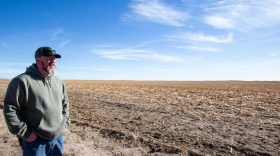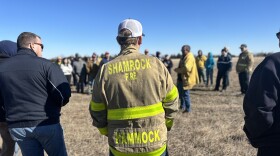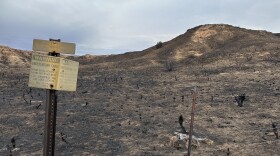Our region is leading the way on training helicopter pilots to fight fires at night. There are costs and hazards involved but the move could also help firefighters get the most threatening blazes under control more quickly.
The Colorado Division of Fire Prevention and Control has trained two pilots so far this year to fly over fire sites with night vision goggles. They work with a ground team that helps guide them.
Vince Welbaum, Aviation Chief for the fire agency, said “we’re basically ready to activate in an operational mode when that opportunity arises.”
One obvious advantage of after-dark firefighting is it increases the number of hours firefighters have to work against the flames. But there are other benefits too, according to Welbaum.
“Basically after sunset is when the winds typically are more favorable,” he explained. “They die down, which essentially allows firefighters to get closer to the flames.”
But there are downsides too, he said. One is the extra cost. Welbaum said the nighttime program has cost Colorado $100,000 so far.
Plus, flying after dark is just inherently riskier. But Welbaum said night vision technology has improved significantly over the years and he’s confident the pilots are ready for the challenge.
Still, Welbaum said the fire has to threaten lives, structures, or economic resources before they’ll consider using the new technology. So far, that hasn’t happened in the state this year.
Welbaum said other states are considering adopting nighttime aerial firefighting capabilities. “They’re waiting to see how we’ve approached,” he said, “it so they don’t have to reinvent the wheel.”
Colorado only has the night vision helicopter on contract until October 9th this year. But the state agency plans to bring back even more nighttime firefighting resources for next year’s fire season.
This story was produced by the Mountain West News Bureau, a collaboration between Wyoming Public Media, Boise State Public Radio in Idaho, KUER in Salt Lake City, KUNR in Nevada, and KRCC and KUNC in Colorado.
Copyright 2019 KRCC








